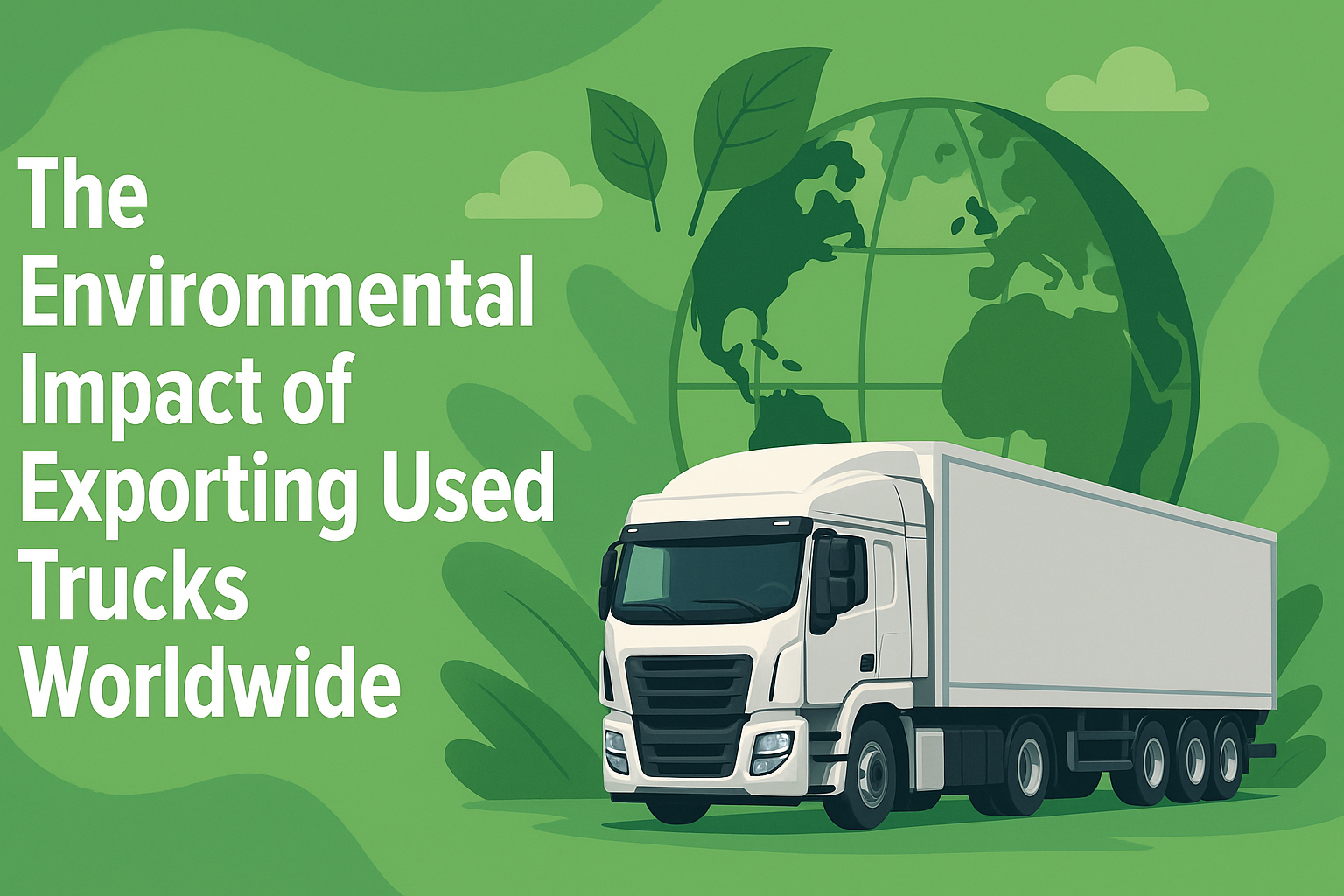The global demand for Japanese used trucks continues to rise. Buyers appreciate their durability, low cost, and long-lasting engines. Yet, as more trucks are shipped to Africa, Southeast Asia, and Latin America, one question remains:
What is the environmental impact of exporting used trucks?
Let’s explore the positive effects, the challenges, and how exporters and buyers can promote more sustainable trade in commercial vehicles.
🌱 Positive Environmental Impacts
✅ 1. Extending Vehicle Lifespan
Exporting used trucks gives them a second life. Instead of being scrapped, they are reused in regions where resources are limited.
-
Reduces the need for new vehicle production
-
Saves raw materials and manufacturing energy
-
Helps small businesses and farmers access affordable transport
This reuse model supports the global circular economy.
✅ 2. Waste Reduction in Japan
Japan’s strict inspection system (Shaken) often leads to early trade-in of vehicles in good condition. By exporting these trucks:
-
Japan avoids overloading its domestic waste systems
-
Other countries benefit from roadworthy, low-emission trucks
-
Valuable parts and systems continue to be used
As a result, useful trucks don’t end up in scrapyards prematurely.
✅ 3. Lower Carbon Footprint Compared to New Manufacturing
Manufacturing a new truck produces large amounts of CO₂. In contrast, reusing a truck involves only shipping and minor servicing.
-
A single truck export emits less carbon than building a new one
-
Especially true if the truck is used for many more years
-
Reduces demand for raw materials like steel and aluminum
This makes used truck export an eco-friendlier option—when properly maintained.
🌍 Environmental Challenges of Exporting Used Trucks
❌ 1. Old Engines and Poor Emissions
Many used trucks lack modern emissions technology.
-
Older diesel engines release more nitrogen oxides and particulate matter
-
Some countries import trucks without enforcing emissions regulations
-
Urban pollution levels rise if old trucks aren’t maintained well
This is especially concerning in large cities with poor air quality.
❌ 2. End-of-Life Disposal Problems
Eventually, exported trucks reach the end of their lifespan.
-
Many countries lack proper disposal or recycling systems
-
Trucks may be dumped, causing environmental hazards
-
Fluids, batteries, and tires can pollute soil and water
Thus, responsible decommissioning plans are necessary.
❌ 3. Fuel Efficiency Gaps
Newer trucks are more fuel-efficient. However, many exported models still use outdated engines.
-
Higher fuel consumption increases CO₂ output
-
Buyers may prefer lower upfront cost over eco-efficiency
-
Long-term operational costs and emissions can rise
Balancing affordability and eco-performance is still a global challenge.
🔧 How Exporters and Buyers Can Reduce Environmental Impact
🌍 For Exporters:
-
Provide emissions test results
-
Offer engine upgrades or tuning
-
Promote hybrid or clean diesel trucks
-
Encourage proper maintenance and service documentation
🌿 For Buyers:
-
Choose trucks with clean engines (Euro 4 or newer)
-
Request JEVIC or QISJ inspection certificates
-
Maintain engine, exhaust, and fuel systems regularly
-
Dispose of the truck responsibly at end-of-life
🚚 Greener Technologies from Japan
Japan is now developing electric commercial trucks, hydrogen-powered trucks, and hybrid commercial vehicles. While these aren’t yet common in the export market, they are on the rise.
-
Isuzu and Hino are testing hybrid and EV trucks
-
Future exports may include more low-emission models
-
Early buyers can reduce their environmental footprint significantly
📦 Final Tip: Ask Before You Import
Before shipping your truck, ask the exporter:
-
What is the emissions rating of the engine?
-
Has it passed recent inspection or tuning?
-
Can I get eco-friendly modifications?
-
Are there recycling services available locally?
👉 Trusted exporters will support green choices. Start with:
Top 5 Trusted Japanese Used Truck Exporters for Global Buyers
✅ Final Thoughts
Exporting used Japanese trucks has both environmental benefits and risks. While it helps reduce waste and supports sustainable reuse, it also requires careful handling of emissions and disposal.
Together, exporters and buyers can reduce the global footprint—one truck at a time.
Would you like a 16:9 blog banner image with the title:
“Environmental Impact of Exporting Japanese Used Trucks”
featuring green graphics and a truck on a globe? Let me know and I’ll generate it for you.
